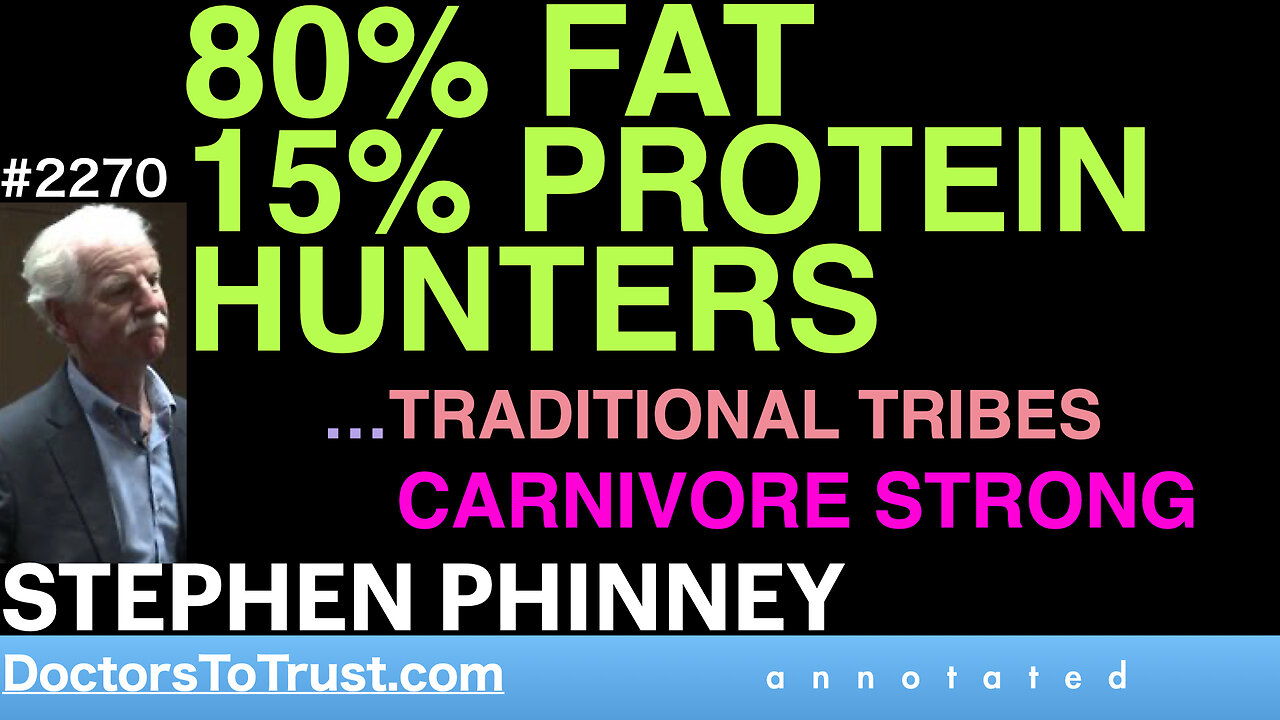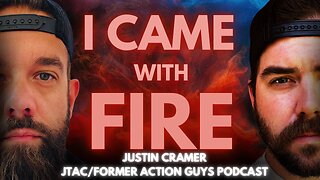Premium Only Content

STEPHEN PHINNEY t2 | 80% FAT 15% PROTEIN HUNTERS…TRADITIONAL TRIBES: CARNIVORE STRONG
http://www.DoctorsToTrust.com
presents episode 2270 | DR STEPHEN PHINNNEY
Nutritional levels of ketones have fuel health and signaling
benefits...
-starts at .5 mmol
-best between 1 and 3 mmol--normal range for
traditional hunters & herders
For most except ultra active: carbs under 50g / day is best
-if IR, need to keep carbs below 30g / day
Researchers studying Masai; Native Americans of the
Great Plains--those who followed the buffalo & did not
plant corn, beans, squash, etc--lived on carnivore diet;
and Inuit in Arctic: ate moderate protein and high fat diet
Their macro intake: 15% animal protein; 80% animal fat
Aboriginal Australians prioritized the tail of the Kangaroo...
-meat is lean, tail is fatty meat
-would hunt turtles only in season in which they were fattest
-most plants in Australia are ultra-low in carbs
Native Americans who followed the buffalo, major hunting
was in fall when buffalo were full of subcutaneous fat
-some young buffalo would have hump of fat on back that
weighted up to 100 kg
-would dry the meat into pemmican, added fat to make a
block of meat & fat provided food for long time
Rest of year would prioritize fatty parts of buffalo
||||||||||||||||||||||||||||||||
doctorstotrust.com
2ketodudes.com
lowcarbdownunder.com.au
original video interview: https://youtu.be/Qu8Y5UZbrxQ?si=6whB6G_0tsjxqIJW
We will never use corruptible, epidemiological survey research as causal science.
For each short/sharable video, the original Youtube links are provided above.
None of this content is intended to be individual, personalized medical advice.
We hope you find value for yourself in these videos &
find them easy to share with loved ones!
DISCLAIMER
The DoctorsToTrust videos are for general informational purposes only
and do not constitute the practice of medicine, nursing or other
professional health care services, including the giving of medical advice,
and no doctor/patient relationship is formed. The use of information on this podcast
or materials linked from this podcast is at the user’s own risk.
The content of this podcast is not intended to be a substitute for
professional medical advice, diagnosis, or treatment. Users should not disregard or
delay in obtaining medical advice for any medical condition they may have and
should seek the assistance of their health care professionals for any such conditions.
-
 LIVE
LIVE
Michael Franzese
8 hours agoThe Hidden Cause of LA's Deadliest Fires in 2025?
821 watching -
 LIVE
LIVE
Bitcoin Sports Network
1 hour agoMax & Stacy Invitational Day 2 Part 1 - LIVE from El Salvador
793 watching -
 59:14
59:14
Tactical Advisor
2 hours agoNew Gun Build / Fires update | Vault Room Live Stream 013
9.55K4 -
 LIVE
LIVE
Vigilant News Network
15 hours agoMeta Staff MELT DOWN as Zuckerberg BETRAYS Wokeness | The Daily Dose
1,964 watching -
 LIVE
LIVE
I_Came_With_Fire_Podcast
10 hours agoGWOT, Brotherhood, and Unspoken Truths: A JTAC's Insights" with Former Action Guys Podcast
493 watching -
 15:59
15:59
GubbaHomestead
20 days agoWhy You Need This For Your Homestead
34.3K8 -
 16:05
16:05
DEADBUGsays
1 day agoTHE BABYSITTER KILLER | Murder by Design #38
59.1K3 -
 12:40
12:40
Chris From The 740
1 day ago $4.42 earnedIs The Walther P22 Still Trash? Let's Find Out
36.6K16 -
 1:00:37
1:00:37
Trumpet Daily
1 day ago $10.16 earnedThe Cause of ‘Natural’ Disasters - Trumpet Daily | Jan. 10, 2025
55.3K32 -
 33:41
33:41
PMG
15 hours ago $1.96 earnedHannah Faulkner and Haile McAnally | OMAHA YR RACE
27.7K4